Stuart Carruthers's Blog, page 3
July 18, 2012
Write what you know? Really?

I was talking to a friend today, an aspiring writer (aren't we all), and he quoted the hoary old adage "write what you know". Teachers trot this out to their students without really expanding upon it.
If we all only wrote what we know, the world of literature would be a much poorer place. There wouldn't be any sci-fi, no fantasy, a limited range of extreme pornography and so on.
But we can use what we know, to fill in the blanks. After all that's all any of do. Fit the sound of a scraping chair into a new environment, or move the sound of silence into space or a desert.
We can't experience everything, so add what you know into your imagined spaces.

Published on July 18, 2012 21:57
July 17, 2012
The heat is rising
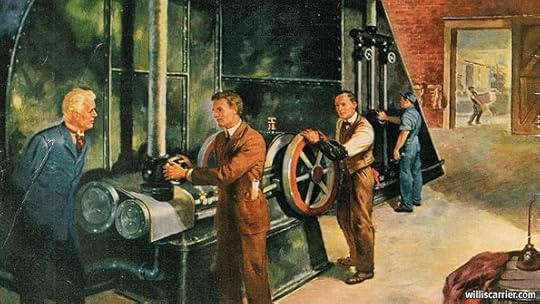
As we're sweltering away in the summer heat outside, inside we're kept cool and functioning by air conditioning. So let's give three cheers for the air conditioner as it hits 110 years old. You can read the Economists blog here.

Published on July 17, 2012 21:59
July 5, 2012
Monied Waters - Book Cover Preview
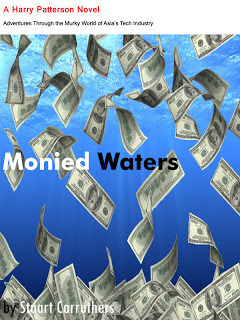
The new book cover for the forth coming Harry Patterson adventure. Follow Harry as he gets involved in the cutthroat world of bio-fuel and discovers the lengths that people will go to in the race for the next liquid gold.
Coming Soon

Published on July 05, 2012 19:46
July 2, 2012
Two Fun Lexicographical web things
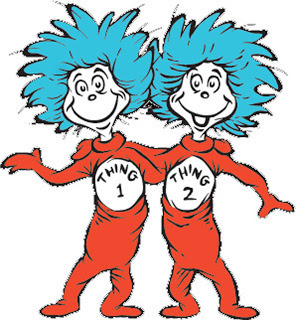
It's been a good day for finding lexicographical things on the web:
Google's Ngram Viewer - input any word or phrase and see how often it's been used since 1800.
The excellent TED talks has a great talk by Erin McKean on redefining the dictionary.

Published on July 02, 2012 19:18
Perfect use for the Interrobang
Published on July 02, 2012 01:54
Favoriite Punctuation Mark - The Interrobang

Never widely adopted, the interrobang is a great piece of punctuation that combines a question mark (?) and an exclamation mark (!) in one symbol, thereby replacing "?!" in writing.
First invented in 1962 by Martin K. Speckter, it was his belief that advertising copy would be better if one mark was used for surprised rhetorical questions. The name comes from the marks that it's created from: interrogatio is Latin for "a rhetorical question" or "cross-examination";[4] bang is printers' slang for the exclamation mark
It's hayday was certainly in the late 1960's with some Remington typewriters including it on their keyboards and even until the 1970's Smith-Corona sold replacement key-caps with the interrobang included.
If you're brave enough you can still use it today as it's been included in the Unicode format and is available in several font including Lucida Sans Unicode, Arial Unicode MS, Calibri and is in the Wingdings 2 character set.
So next time you want to shake up your punctuation add an interrobang

Published on July 02, 2012 00:40
June 15, 2012
The Hereo's Journey
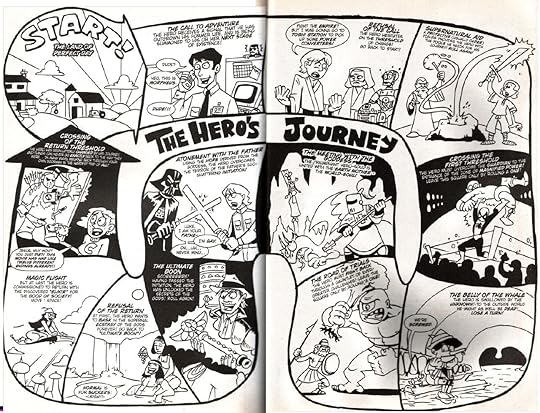
For the second time in the same day I've learnt something new and once again I've been doing it unconsciously. The Hero's Journey was first identified by American Scholar Joseph Campbell back in 1949 and contains 17 stages of plot that most books, plays and movies contain. George Lucas admitted to using it for the Star Wars Movies.
These seventeen steps can be put into the 3 Acts of a play and then broken down into the scenes of each of the acts:
Act 1 - Departure
The Call to Adventure
The call to adventure is the point in a person's life when they are first given notice that everything is going to change, whether they know it or not.
Refusal of the Call
Often when the call is given, the future hero refuses to heed it. This may be from a sense of duty or obligation, fear, insecurity, a sense of inadequacy, or any of a range of reasons that work to hold the person in his or her current circumstances.
Supernatural Aid
Once the hero has committed to the quest, consciously or unconsciously, his or her guide and magical helper appears, or becomes known.
The Crossing of the First Threshold
This is the point where the person actually crosses into the field of adventure, leaving the known limits of his or her world and venturing into an unknown and dangerous realm where the rules and limits are not known.
The Belly of the Whale
The belly of the whale represents the final separation from the hero's known world and self. It is sometimes described as the person's lowest point, but it is actually the point when the person is between or transitioning between worlds and selves. The separation has been made, or is being made, or being fully recognized between the old world and old self and the potential for a new world/self. The experiences that will shape the new world and self will begin shortly, or may be beginning with this experience which is often symbolized by something dark, unknown and frightening. By entering this stage, the person shows their willingness to undergo a metamorphosis, to die to him or herself.
Act 2 - Initiation
The Road of Trials
The road of trials is a series of tests, tasks, or ordeals that the person must undergo to begin the transformation. Often the person fails one or more of these tests, which often occur in threes.
The Meeting with the Goddess
The meeting with the goddess represents the point in the adventure when the person experiences a love that has the power and significance of the all-powerful, all encompassing, unconditional love that a fortunate infant may experience with his or her mother. It is also known as the "hieros gamos", or sacred marriage, the union of opposites, and may take place entirely within the person. In other words, the person begins to see him or herself in a non-dualistic way. This is a very important step in the process and is often represented by the person finding the other person that he or she loves most completely. Although Campbell symbolizes this step as a meeting with a goddess, unconditional love and /or self unification does not have to be represented by a woman.
Woman as the Temptress
At one level, this step is about those temptations that may lead the hero to abandon or stray from his or her quest, which as with the Meeting with the Goddess does not necessarily have to be represented by a woman. For Campbell, however, this step is about the revulsion that the usually male hero may feel about his own fleshy/earthy nature, and the subsequent attachment or projection of that revulsion to women. Woman is a metaphor for the physical or material temptations of life, since the hero-knight was often tempted by lust from his spiritual journey.
Atonement with the Father
In this step the person must confront and be initiated by whatever holds the ultimate power in his or her life. In many myths and stories this is the father, or a father figure who has life and death power. This is the center point of the journey. All the previous steps have been moving in to this place, all that follow will move out from it. Although this step is most frequently symbolized by an encounter with a male entity, it does not have to be a male; just someone or thing with incredible power. For the transformation to take place, the person as he or she has been must be "killed" so that the new self can come into being. Sometime this killing is literal, and the earthly journey for that character is either over or moves into a different realm.
Apotheosis
To apotheosize is to deify. When someone dies a physical death, or dies to the self to live in spirit, he or she moves beyond the pairs of opposites to a state of divine knowledge, love, compassion and bliss. This is a god-like state; the person is in heaven and beyond all strife. A more mundane way of looking at this step is that it is a period of rest, peace and fulfillment before the hero begins the return.
The Ultimate Boon
The ultimate boon is the achievement of the goal of the quest. It is what the person went on the journey to get. All the previous steps serve to prepare and purify the person for this step, since in many myths the boon is something transcendent like the elixir of life itself, or a plant that supplies immortality, or the holy grail.
Act 3 - Return
Refusal of the Return
So why, when all has been achieved, the ambrosia has been drunk, and we have conversed with the gods, why come back to normal life with all its cares and woes?
The Magic Flight
Sometimes the hero must escape with the boon, if it is something that the gods have been jealously guarding. It can be just as adventurous and dangerous returning from the journey as it was to go on it.
Rescue from Without
Just as the hero may need guides and assistants to set out on the quest, often times he or she must have powerful guides and rescuers to bring them back to everyday life, especially if the person has been wounded or weakened by the experience. Or perhaps the person doesn't realize that it is time to return, that they can return, or that others need their boon.
The Crossing of the Return Threshold
The trick in returning is to retain the wisdom gained on the quest, to integrate that wisdom into a human life, and then maybe figure out how to share the wisdom with the rest of the world. This is usually extremely difficult.
Master of the Two Worlds
In myth, this step is usually represented by a transcendental hero like Jesus or Buddha. For a human hero, it may mean achieving a balance between the material and spiritual. The person has become comfortable and competent in both the inner and outer worlds.
Freedom to Live
Mastery leads to freedom from the fear of death, which in turn is the freedom to live. This is sometimes referred to as living in the moment, neither anticipating the future nor regretting the past.
You can watch a video explaining it all here:
To save you a lot of hard work you can even follow this interactive Hero's Journey template.
So the question is can you avoid following it now you know about it or does knowing about it enable you to break the pattern? I'll let you know.
http://www.amazon.com/As-the-Crow-Dies-ebook/dp/B006ZHK4JY/ref=sr_1_3?ie=UTF8&qid=1339749031&sr=8-3

Published on June 15, 2012 01:31
June 14, 2012
Planner or Pantser?
 or
or

When it comes to writing, 99% of the stuff I read on line talks about planning. Here's a great example, It talks about the 3Act play, and having scenes and beats and that before you begin writing a single word you should have this written down and planned in quite a lot of detail.
But I say bullshit. It's not that you shouldn't have some sort of idea where you want to begin and what you vaguely want to happen but that's as far I ever go. The middle bit is made up on the fly. I know the name of the main character and what the story will involve, but that's as far as it goes.
Are there problems with this? Sure, I guess so. But whichever way you cut it, writing is hard. If you're a planner, the novel requires a great deal of thought to work things out, but pantsers just do this later or in the revisions, somewhere along the process of writing there will be points where you have no idea where the story is going or that you're near the end and it runs out of steam, But you either do this in the planning stage or in the writing.
I say do what comes naturally to you. My name is Stuart and I'm a pantser.

Published on June 14, 2012 18:30
May 31, 2012
Judging a book by its cover Part 3
In part of an interesting post by JA Konrath he explores the use of animated covers, which, whilst not supported by online booksellers just yet, do certainly catch the eye.
Whilst there are certainly design issues with some of them, they do show what can be done to attract readers attention. He really doesn't need the little publicity this blog will give, but these are worthy of comment.
http://jakonrath.blogspot.tw/2012/05/ja-konrath-vs-stephen-king.html.


The only problem I see is that if these styles of covers become ubiquitous there'll be too much noise and we'll be back at square one, where the most noticeable covers are the static variety, In the same way that the most noticeable TV ads are the black and white variety that don't scream and shout at you.

Whilst there are certainly design issues with some of them, they do show what can be done to attract readers attention. He really doesn't need the little publicity this blog will give, but these are worthy of comment.
http://jakonrath.blogspot.tw/2012/05/ja-konrath-vs-stephen-king.html.


The only problem I see is that if these styles of covers become ubiquitous there'll be too much noise and we'll be back at square one, where the most noticeable covers are the static variety, In the same way that the most noticeable TV ads are the black and white variety that don't scream and shout at you.

Published on May 31, 2012 20:28
May 27, 2012
Judging a Book by its Cover Part 2
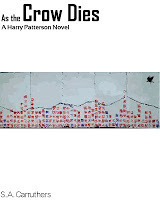
Cover 1
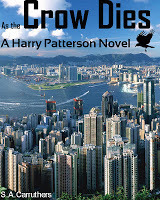
Cover 2
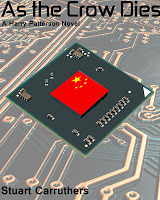
Cover 3
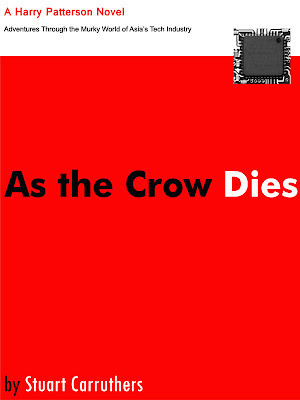
Cover 4 and Final
It appears that the subject of covers of e-books is on everybody's mind recently. Not least on my because I keep redesigning my own e-book cover.
In lieu of the fact that I'm no designer, I've taken inspiration from an excellent essay on the subject of book covers from Craig Mod
http://craigmod.com/journal/hack_the_cover/

Published on May 27, 2012 20:51

























